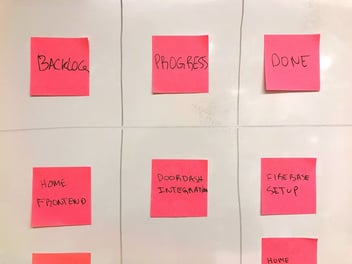Mobile health apps needs to be developed in accordance to guidelines to facilitate smooth integration and keep the business on track once the app is introduced.
When designing your mobile app, it is important to think about how users (patients) and the business (staff and practitioners) will be operating the application. While tablets, specifically iPads, are popularly used in many health and medical institutions, this may not be the right solution for your patients.
If the app is primarily geared toward your patients as the users, designing an app that best fits a smart phone will better serve your purposes. If the app will be used on any combination of tablets, smartphones, or even desktops, your development team will need to keep all possible devices in mind.
Many medical institutions have a multitude of databases, software, security programs, and hosting that they operate in order to maintain both their business and patient files. Your mobile health application needs to be designed in accordance with all of these systems in order to facilitate smooth integration and keep the business on track once the app is introduced. It can be easy to get lost in the excitement of innovation and new technologies, but you must remember that proper development will keep your existing technology and processes in mind.
Like any other custom mobile app development, UI and UX are integral to a positive consumer experience. Bad or glitchy UI/UX will leave your consumers feeling confused, frustrated, and unwilling to use your application. The interface must work well for all parties, including consumers, medical professionals, and administrative staff. This variety of users presents a specific challenge, but it is important to consider. The app will not be successful if it does not work efficiently and well for all parties involved.
Cybersecurity is a growing concern and reality for businesses, and this concern is actually higher for health and medical institutions. This is because health and medical professionals have the additional responsibility of protecting their patients’ private data. Security must be a priority when developing your mobile health application. You can strive toward maximized security by integrating end-2-end encryption, or sending data over secure communication channels only. This is where health app development truly becomes unique because of the need to balance speed, UI/UX, and security.
In addition, with new compliance laws, your app needs to follow HIPAA. The Health Insurance Portability and Accountability Act of 1996 (HIPAA) outlines the lawful use and disclosure of protected health information (PHI). HIPAA compliance is extremely important, as failure to protect patients’ private information can lead to compromising the patients’ privacy and serious legal implications for health practitioners. In order to ensure that your Mobile Health App is HIPAA compliant, it's important to work with an agency that already has experience with and understanding of HIPAA regulations.
Another health app development capability to also consider are embedded systems, which are the backbone of many systems in the healthcare space. This is due to the multitude of devices, machines and tools that doctors and medical institutions use during the process of working with patients. Being able to have all these systems and data seamlessly integrate and work with one another is integral to ensuring a strong health app.
Flexibility is one of the keys to success in the mobile app development process. Roadblocks and obstacles are bound to appear along the way, so you have to be willing to be agile. The developers and the client must work together to be nimble and make changes on the fly, on a budget, and feature level as issues arise. No matter which role you play, constant communication is key.
Mobile health app development provides unique challenges that developers and clients need to keep in mind, but it is essential to build a secure, user-friendly app to best serve patients in the 21st century. Following these considerations will help smooth out the development process, and keep you on track toward efficiency and success.

Mikko Salokangas,
Head of Development


